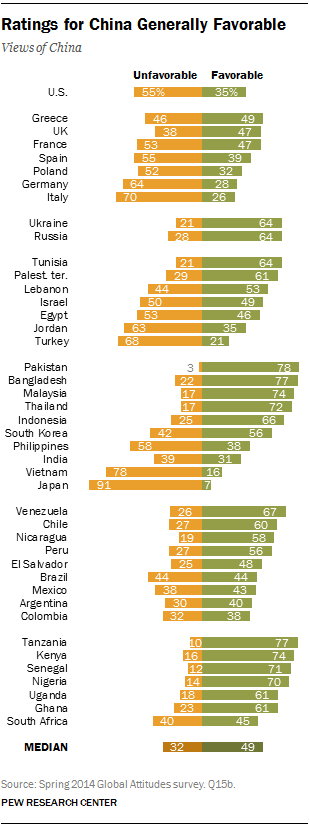
On balance, global views of China are positive, although ratings for the Asian power vary significantly across nations and regions. Similarly, China’s growing economic might is generally seen as a good thing in most of the countries surveyed. However, in some nations China’s increasing prosperity is considered a threat.
Meanwhile, Beijing’s human rights record remains a relative weak spot for China’s global image. In particular, Americans, Europeans and Japanese overwhelmingly believe the Chinese government does not respect the rights of its own people.
Across 43 nations, a median of 49% express a favorable opinion of China, while 32% offer an unfavorable rating. However, its overall image in the United States and Europe is mostly negative.
Only 35% of Americans have a positive view of China, while 55% have a negative one. Unfavorable ratings are more common among Republicans (65%) than among Democrats (53%) or independents (51%). China’s image in the U.S. has become more negative in recent years – as recently as 2011 half of Americans gave China a positive rating.
Roughly half or more in Italy, Germany, Poland, Spain and France give China an unfavorable rating. The United Kingdom is the only European Union nation polled in which opinions about China are on balance favorable.
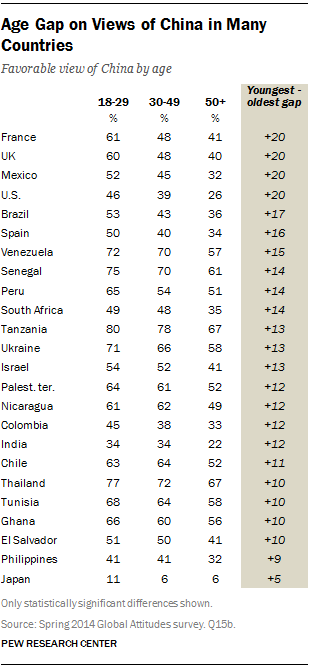
Asian attitudes toward China differ considerably across the region. Two-thirds or more voice a positive opinion in the predominantly Muslim Asian nations surveyed – Pakistan, Bangladesh, Malaysia and Indonesia – as well as majority Buddhist Thailand. A 56% majority also holds a favorable view in South Korea, up from 46% in 2013.
In contrast, huge majorities give China a negative rating in Japan and Vietnam. And 58% of Filipinos have an unfavorable opinion, compared with 48% in last year’s poll. All three of the latter Asian nations are involved in territorial disputes with Beijing.
China receives mostly positive reviews in the sub-Saharan African nations polled, although South Africans are closely divided (45% favorable, 40% unfavorable). Latin American views of China are more positive than negative, although many in the region offer no opinion. And in both Brazil and Argentina, the percentage of people with a positive view has declined significantly in the last year (-21 and -14 percentage points, respectively).
Across the globe, young people tend to have more positive attitudes toward China than older respondents. In 23 nations, people ages 18 to 29 give China higher ratings than do those ages 50 and older. In the UK, Mexico, the U.S. and France, the gap between older and younger respondents is 20 percentage points.
China’s Growing Economic Might
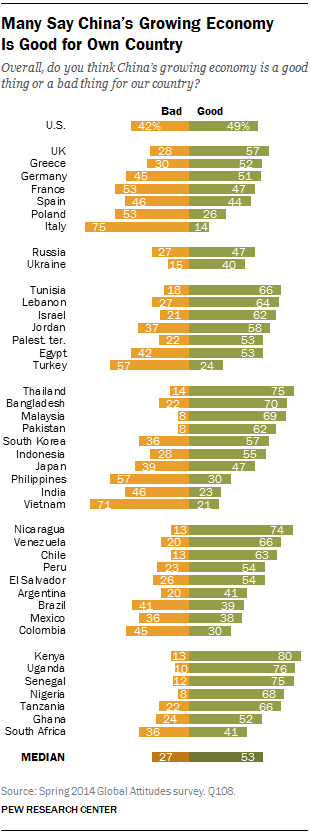
As China’s economy has continued to grow over the past several years, it has developed extensive economic ties with nations around the world, generating both goodwill and anxieties about economic competition. Overall, the publics surveyed tend to say China’s progress is good for their own country as well. Across 43 nations, a median of 53% believe China’s growing economy is a good thing for their own economy. Just 27% say this is a bad thing.
However, as with other questions about China, opinions differ sharply across regions, and sometimes within regions. For instance, by a more than 2-to-1 ratio, the British say China’s growth is good for the UK economy, and roughly half in Greece and Germany hold the same view about their own economy. In contrast, three-in-four Italians believe China’s economic success hurts their economy, and more than half in Poland and France agree.
In China’s neighborhood, the prevailing view is that Chinese growth helps others in the region, with majorities in Thailand, Bangladesh, Malaysia, Pakistan, South Korea and Indonesia saying China’s economic expansion is good for their own country. Even in Japan, where overall ratings for its longtime rival are quite low, a 47% plurality believes China’s economic growth is beneficial, although this is actually down from the 57% registered in 2011. Meanwhile, majorities in the Philippines and Vietnam consider China’s economic success a bad thing, as do a 46% plurality of Indians.
Americans are somewhat divided over China’s economic impact. Roughly half (49%) say it is good, while 42% describe it as a bad thing. This is a shift from the last time the Pew Research Center asked this question in 2011. Then, only 37% felt China’s growing economy was having a positive effect on the U.S.; 53% said it was having a negative impact.
In six of the seven Middle Eastern nations surveyed (with the exception of Turkey), more than half believe China’s economy is helping their own country.
Similarly, many of the Latin American publics polled see Chinese growth as beneficial, although Mexicans and Brazilians are divided on this issue. And in Brazil, which counts China as its largest trading partner, attitudes have shifted since 2011, when 53% said China was having a positive effect on the Brazilian economy. Today, it’s just 39%. And a clear exception in the region is Colombia, where a 45% plurality sees China’s economic advances in a negative light.
As they have in previous surveys, Africans continue to embrace China’s economic growth. China has invested heavily in the region in recent years, and two-thirds or more in Kenya, Uganda, Senegal, Nigeria and Tanzania describe China’s economic influence in positive terms, as do about half of Ghanaians. Once again, South Africans express more divided views about China than do others in the region.
China and Individual Rights
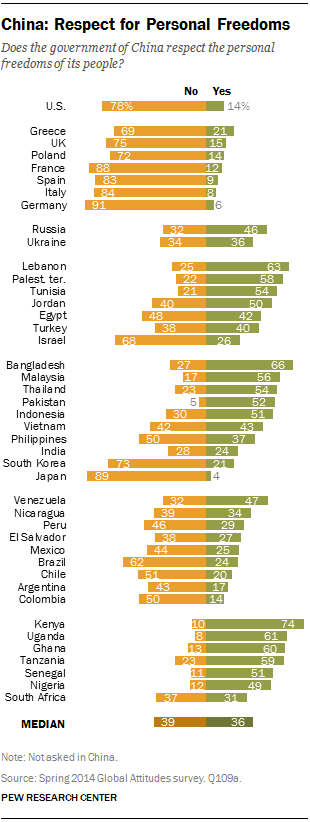
For years, China’s human rights record has been the subject of tremendous controversy, and in this year’s poll the Communist Party government receives mixed reviews for how it treats its own citizens. Across the nations surveyed, a median of 36% say the Chinese government respects the personal freedoms of its people, while 39% say it does not.
In the U.S. and the EU, however, there is a clear consensus on this issue – large majorities believe Beijing does not respect personal liberties, including more than eight-in-ten in Germany, France, Italy and Spain. And 78% of Americans agree.
Broad majorities say China does not respect personal freedoms in the two most economically advanced Asian nations surveyed, Japan and South Korea. Half of Filipinos also hold this view. Elsewhere in the region, however, China receives higher ratings on this issue. Half or more in Bangladesh, Malaysia, Thailand, Pakistan and Indonesia say China respects its people’s rights.
China also receives mostly positive marks on this question in Lebanon, the Palestinian territories, Tunisia and Jordan. Egyptians and Turks are divided, while nearly seven-in-ten Israelis believe the Chinese government does not respect personal freedoms.
Many Latin Americans do not have an opinion about this issue, although in many of the nine countries polled in the region public opinion leans toward the view that China does not respect individual rights.
In Africa many do not offer an opinion, although on balance in most of the African nations surveyed publics tend to believe that Beijing respects personal freedoms.
Opinions about Xi Jinping
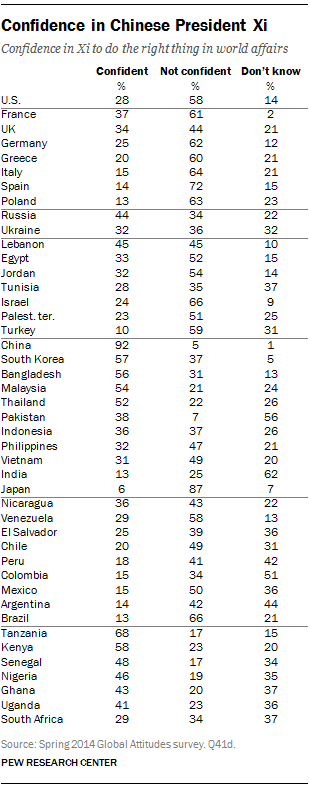
Chinese President Xi Jinping, who has been in office for a little over one year, so far has failed to make a strong positive impression on global publics. Overall, ratings for Xi are more negative than positive, while at the same time many are unfamiliar with the Chinese leader.
However, Xi is viewed favorably in several neighboring countries. Half or more of publics in South Korea, Bangladesh, Malaysia and Thailand say they have confidence in him to do the right thing in world affairs. And roughly nine-in-ten (92%) hold this view in China itself.
But he is far from universally embraced in the region. For instance, an overwhelming 87% of Japanese say they have little or no confidence in him to do the right thing in world affairs. And a 47% plurality of Filipinos agrees.
The Chinese leader gets mostly poor reviews in the West. Nearly six-in-ten Americans (58%) lack confidence in Xi, as do most in Spain, Italy, Poland, Germany, France and Greece.
Xi’s ratings are largely negative in the Middle East, especially in Israel and Turkey. Many in Latin America and Africa do not have an opinion about the new Chinese leader, but among those who do, Xi receives largely negative reviews in Latin America, while Africans give him mostly favorable marks.




